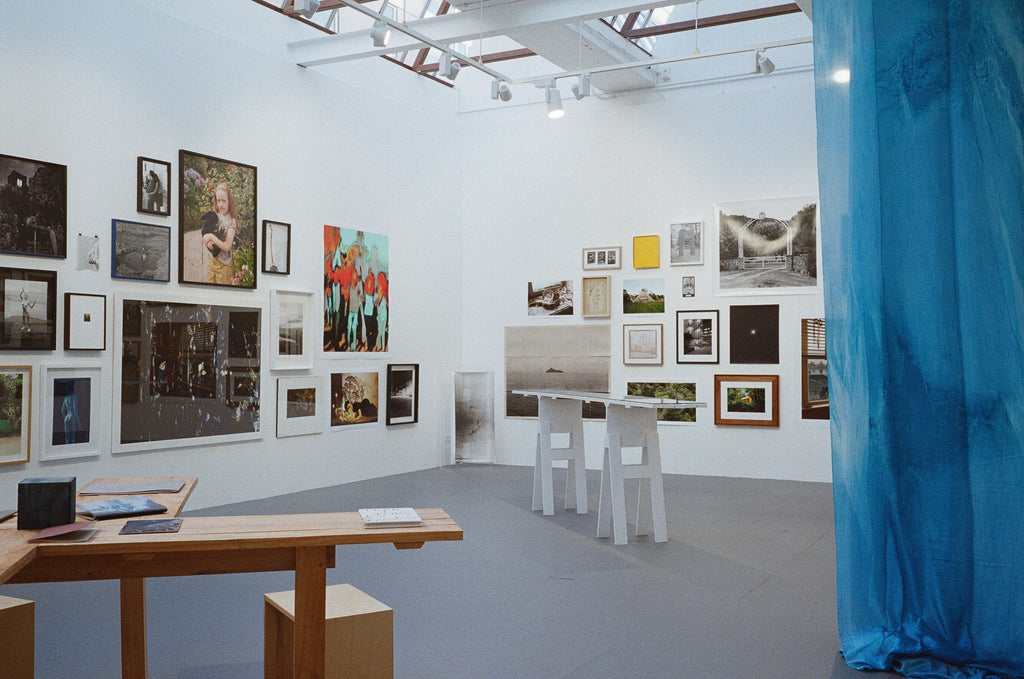Analogue (n.) Show at Massey University Wellington - interview with Caroline McQuarrie

Analogue (n.)
The Engine Room, Massey University Wellington
12-4pm Mon-Sat until 9 August
Panel discussion and closing event: 2-4pm Saturday 9 August
Celebrating 50 Years of Massey’s Photography Department.
A Photographic Exhibition at The Engine Room, Massey University Wellington showcasing current and past students and tutors and lecturers, basically some of those who have been a part of the success of Massey’s Photography Department.
This show celebrates analogue photography and highlights despite a growing and evolving digital world, analogue photography still has a deep presence at Massey. They recognise the role of the darkroom and how it is still an important part of learning and process.
The diversity of work involved in this show reflects the importance of the photography department. These works are the outcome of an incredible community of people and the generosity of photographic knowledge passed on.

Abi has asked Caroline McQuarrie a few questions;
How many people are involved in this show? Who made it happen?
We have works from 102 people in the exhibition, which was an amazing response to an open call that we put out only 6 weeks before the exhibition opened. Shaun Waugh and I led the organising process but our whole team including students pitched in to help - particularly with hanging the work which was a huge job. Our technical demonstrator Will Bennett led the install and he did an incredible job. We have works from some of the biggest names in Aotearoa photography sitting alongside current students, it’s a fantastic range.
Such a great idea to put on a collaborative exhibition to celebrate 50 years, what was the process like?
We knew we wanted to have an exhibition at the Engine Room in the heart of our campus as part of the suite of celebrations for our 50th anniversary. Initially we had planned to curate something much more traditional, but it was Shaun’s idea to open it up to our wider community with quite a broad theme and it was such a great idea. The analogue theme celebrates our beautiful new darkroom facilities and is a reminder that analogue teaching is still a big part of our programme. The exhibition process has shown us that our community is generous, and that if you give people the opportunity to be involved in something they jump in enthusiastically and help. We had people send us work from overseas - two works are from people based in the US, one from the UK and one from Australia. Even though it has meant a few late nights I would say mostly the process has reminded me of all the amazing people I’ve had the privilege to teach and work alongside over the years, which fills your heart up a little bit.

How would you describe the Massey University Photography community?
Staff in the Photography programme at Massey work hard to create a strong community on campus, and we hope that flows out into the wider Aotearoa photographic community when students graduate. Our students and graduates work in lots of areas in (and outside of) photography; we are open to commercial, art and documentary work and we love the diversity of what our students make. We are lucky to attract incredibly talented students who think hard about photography and where it sits in our culture, which is so important for the future of the medium.
50 years is a long time and photography has changed rapidly the past 20-30 years. How has the Massey Photography Department changed or evolved over the last 50 years?
When the programme was started in 1975 photography was a very different field in lots of ways. At first Wellington Polytechnic offered a two year Diploma, when Massey University bought the Polytech a four year Bachelor of Design began to be offered, with Photography as an option as one of the majors. Now you can be a photographer and be enrolled in the Bachelor of Design, Bachelor of Fine Arts, Masters of Fine Arts, Masters of Design and PhD. One big change technologically was of course the shift to digital; staff at the time really took that on board and we have leading colour managed digital printing facilities and were early adopters of high end film scanners and digital cameras. One interesting change is the gender shift - from being a predominantly male dominated subject to now around three quarters of our students being female, which is common across our college, and universities generally.

My friends and I like to do this thing called ‘Peak, Pit and Banana’.
We reflect on our day or past week with a ‘Peak’ being a highlight, a ‘Pit’ being a lowlight and a ‘Banana’ being something that stood out as random. I’d like to ask you what your ‘Peak, Pit and Banana’ has been so far being involved in the Massey Photography Department?
Great question! All my peaks are when we’re reminded of how meaningful our community is - like at our opening last week. Graduations and student exhibition openings would be up there, when students' parents come along and there’s so much pride in their achievements. For me personally some of the public events I’ve been involved with have been real highlights, like organising the Peter Turner Lectures at Te Papa, getting involved in Photobook NZ and the symposium on Women in Photography I helped organise at Te Papa in 2023. My pit was definitely in 2012 when we lost a 3rd year student in a car accident, trying to support students in their grief when we were feeling devastated too was incredibly difficult. I think my banana is that I’m still here! I did my MFA at Massey in 2004-2005 after working in photographic labs in London in my 20s and started teaching part time while I studied. I’ve taught in every semester since in some capacity, but I didn’t really plan for it to be such a massive part of my life. I’m incredibly grateful for it though, I’ve been mentored by some outstanding colleagues, and it’s amazing to get to help create and shape your community - I love that I get to be friends with graduates who I’ve known now for up to 20 years and who I really admire as they have grown into their careers.
How do you see the future of the photography department going?
We are really excited about the future of our programme. What does it look like? We’re not really sure, I don’t think anyone can be in these uncertain times. I’ve always been a fan of a Geoffrey Batchen definition of photography where rather than link the photographic to any particular technology he describes it as “a persistent economy of photographic desires and concepts”. As long as there is an economy of images, and a desire to make and consume them there will be people who want to make them and think critically about them. And if we take that attitude rather than wed ourselves to specific technologies we can be flexible and adapt. Coinciding with our 50th anniversary we have also just moved into newly built facilities - studios and print finish facilities and a new 18 booth darkroom and separate alternative process area. We know how popular analogue processes are with our students and we think they will continue to be as the veracity of digital imagery comes even more into question with the rise of AI. We’re excited to keep analogue skills alive as a core part of our programme alongside other key photographic skills and thinking.
Go and check out the show while it's on, there is an incredible selection of works.

Photographs taken on Kodak Ultramax 35mm by Abigail Legg @ Splendid Photo

Leave a comment